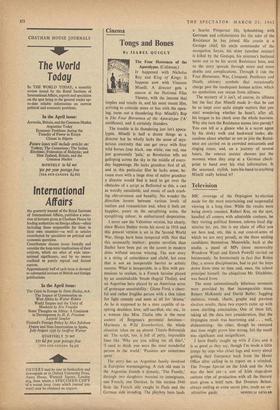Cinema
Tongs and Bones
By ISABEL QUIGLY
The Four Horsemen of the Apocalypse. (Coliseum.) IT happened with Nicholas Ray and King of Kings. It happens now with Vincente Minelli. A director gets, a season at the National Film Theatre, with the interest that implies and results in, and his most recent film, arriving to coincide more or less with the open- ing, turns out a thundering flop. Minelli's flop is The Four Horsemen of the Apocalypse ('A' certificate), and it certainly thunders.
The trouble is its thundering just isn't apoca- lyptic. Minelli is half a dozen things as a director but he wholly lacks the sense of mys- terious enormity that can get away with four wild horses (one black, one white, one red, one just gruesomely 'pale,' as Revelation tells us) galloping across the sky in the middle of every- day happenings. He lacks grandeur first of all, and in this particular film he lacks sense, be- cause even with a large dose of native grandeur a director would find it hard to get over the obstacles of a script as flatfooted as this, a cast as weirdly unsuitable, and music of such crash- ing obtrusiveness and banality. No wonder the direction hovers between various levels of realism and romanticism and, when it feels un- happiest, pours on the earsplitting noise, the eyesplitting colour, in embarrassed desperation.
I never saw the Valentino version, but clearly, since Blasco Ibanez wrote his novel in 1916 and this present version is set in the Second World War, things have been tampered with. Not that this necessarily matters: greater novelists than lbaiiez have been put on the screen in modern dress without anyone wincing. The new story is a string of coincidence and cliche, but even that is not an insuperable barrier to artistic success. What is insuperable, in a film with pre- tensions to realism, is a French heroine played by an unmistakable Swede (Ingrid Thulin), and an Argentine hero played by an American actor of grotesque unsuitability: Glenn Ford, a cheer- ful and rather froglike person with a thin talent for light comedy and none at all for 'drama.' As he is supposed to be a man capable of in- spiring deathless love, self-sacrifice, etc. etc., in a woman like Miss Thulin (she is the most austere of Bergman's perennial heroines— Marianne in Wild Strawberries), the whole situation takes on an almost Titania-Bottomish air. The script, too, is full of petty, impossible lines like 'Why are you telling me all this?,' 'I used to think you were the most wonderful person in the world,' Passions arc sometimes spent.'
The story has an Argentine family involved in European warmongering. A rich old man in the Argentine founds a dynasty, 'The Family,' through two daughters married to immigrants, one French, one German. In this version 1940 finds the French side caught in Paris and the German side invading. The playboy hero leads a Scarlet Pimpernel life, hobnobbing with Germans and collaborators for the sake of the Resistance he has joined. His cousin is a Gestapo chief, his uncle commander of the occupation forces, his sister (another resister) is killed by the Gestapo, his mistress's husband turns out to be his secret Resistance boss, and so the story spreads through more and more deaths and complications. Through it ride the Four Horsemen, War, Conquest, Pestilence and Death, abitrary symbols that occasionally charge past the inadequate human action, which no symbolism can rescue from silliness.
The mystery of it isn't, of course, its silliness but the fact that Minelli made it—that he can be so inept over quite simple matters that you start wondering whether he hasn't, after all, his tongue in his cheek over the whole business. Why else turn the Resistance scenes into parody? You can tell at a glance who is a secret agent by his slinky walk and backward looks; dis- cussions about whether or not to join the Resist- ance are carried on in crowded restaurants and ringing tones; and, on a journey of several hours, the veteran resister chooses just the moment when they stop at a German check- point to hand over his vital information. Is the seasoned, stylish, turn-his-hand-to-anything Minelli really behind it?


































 Previous page
Previous page